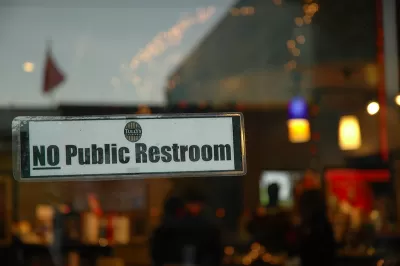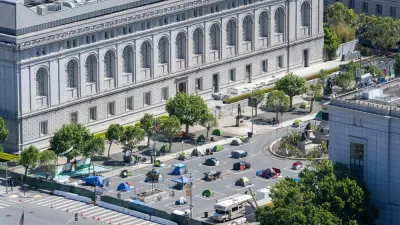For many people with chronic illnesses, access to public restrooms can be a critical medical issue. Incentivizing businesses to open their restrooms can fill a critical gap in U.S. cities.

In a piece for Bloomberg CityLab, Michael Osso and Marilyn G. Geller call for a new solution to the “great urban restroom shortage,” an issue Planetizen has highlighted before.
“Most of us have experienced the challenge of finding a public restroom, but for many, restroom access isn’t just a matter of convenience — it’s a serious medical issue,” the authors, respectively the president and CEO of the Crohn’s & Colitis Foundation and the Celiac Disease Foundation, argue. Since many U.S. cities lack adequate restroom facilities, Osso and Geller suggest that, in lieu of a targeted public investment in more public facilities, private businesses should open their restroom doors to the public, and governments should incentivize them to do so through direct payments or tax credits.
We expect the generosity of participating businesses to be fully paid back in the form of increased goodwill — and revenue, above and beyond any incentives. In fact, a recent Crohn’s & Colitis Foundation survey found that more than three-quarters of inflammatory bowel disease (IBD) patients stated that they were more likely to patronize a business if they could find their restrooms on a restroom finder app.
The authors point out that similar incentives to encourage businesses to comply with Americans with Disabilities Act (ADA) guidelines already exist, and restroom incentive programs are popular in Germany and the United Kingdom. Making more restrooms publicly available, they write, can benefit businesses and make cities easier to navigate for more people.
FULL STORY: How to Solve the Great Urban Restroom Shortage

Maui's Vacation Rental Debate Turns Ugly
Verbal attacks, misinformation campaigns and fistfights plague a high-stakes debate to convert thousands of vacation rentals into long-term housing.

Planetizen Federal Action Tracker
A weekly monitor of how Trump’s orders and actions are impacting planners and planning in America.

San Francisco Suspends Traffic Calming Amidst Record Deaths
Citing “a challenging fiscal landscape,” the city will cease the program on the heels of 42 traffic deaths, including 24 pedestrians.

Defunct Pittsburgh Power Plant to Become Residential Tower
A decommissioned steam heat plant will be redeveloped into almost 100 affordable housing units.

Trump Prompts Restructuring of Transportation Research Board in “Unprecedented Overreach”
The TRB has eliminated more than half of its committees including those focused on climate, equity, and cities.

Amtrak Rolls Out New Orleans to Alabama “Mardi Gras” Train
The new service will operate morning and evening departures between Mobile and New Orleans.
Urban Design for Planners 1: Software Tools
This six-course series explores essential urban design concepts using open source software and equips planners with the tools they need to participate fully in the urban design process.
Planning for Universal Design
Learn the tools for implementing Universal Design in planning regulations.
Heyer Gruel & Associates PA
JM Goldson LLC
Custer County Colorado
City of Camden Redevelopment Agency
City of Astoria
Transportation Research & Education Center (TREC) at Portland State University
Jefferson Parish Government
Camden Redevelopment Agency
City of Claremont





























